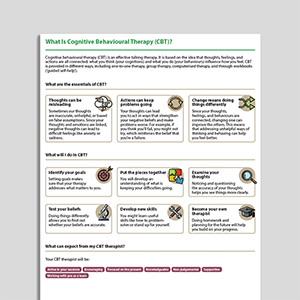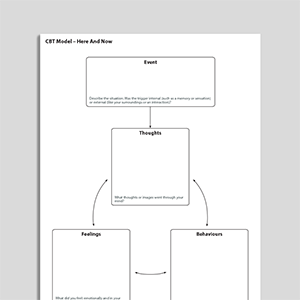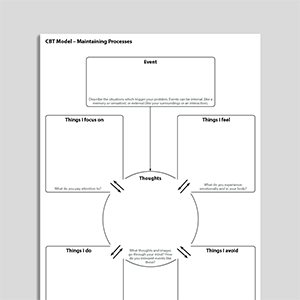Psychology Tools for Living Well
A short self-help guide based on cognitive behavioural therapy (CBT) principles.
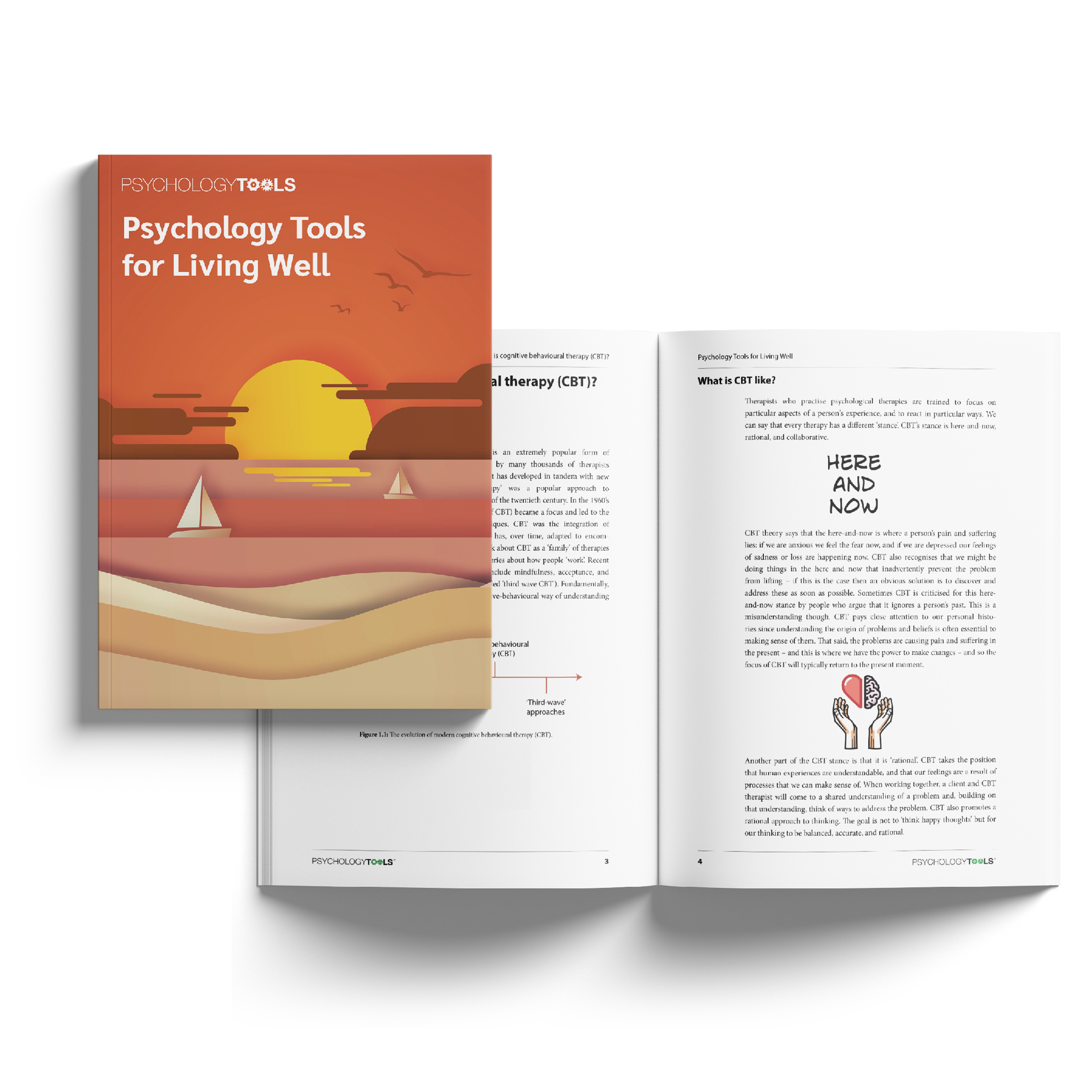
Download or send
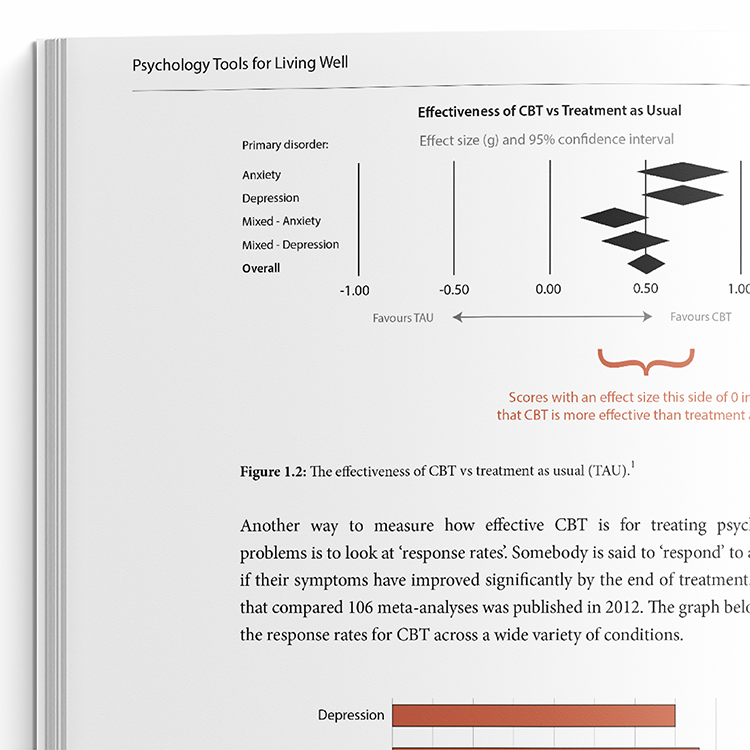
Overview
Psychology Tools for Living Well is a structured guide that introduces clients to the core principles of CBT. Developed to be accessible for both self-guided use and use within therapy, it covers basic principles of CBT, a guide to emotions, the role of thoughts, and 'CBT ways' of understanding common problems.
Why use this resource?
This resource is grounded in CBT theory. It gives clients a strong foundation in understanding how their thoughts, feelings, and behaviours interact.
- Demonstrates how CBT concepts apply to real-life emotional difficulties.
- Includes visual models, case examples, and practical worksheets.
- Addresses emotional regulation, biased thinking, avoidance, and self-criticism.
Key benefits
Structure
Insight
Engagement
Versatility
What difficulties is this for?
Depression
Supports individuals experiencing persistent low mood, loss of interest, hopelessness, or reduced motivation.
Anxiety
Helps clients who struggle with excessive fear, worry, or intolerance of uncertainty.
Low Self-Esteem
Addresses self-critical thinking.
Emotional Distress
Designed for individuals who feel overwhelmed, stuck, or are experiencing general psychological discomfort.
Integrating it into your practice
Assign
Recommend relevant chapters and exercises as structured self-help between sessions.
Guide
Walk clients through key sections during therapy to reinforce psychoeducation.
Rehearse
Practice skills in-session before encouraging clients to try them independently.
Support
Offer additional guidance on interpreting worksheets and overcoming challenges.
Theoretical background and therapist guidance
Psychology Tools for Living Well is grounded in the principles of cognitive behavioural therapy. It begins with psychoeducation, explaining the historical development of CBT and its stance as collaborative, evidence-based, and focused on the here-and-now. The text introduces cognitive, behavioural, and emotional processes that maintain psychological problems, such as biased attention, safety behaviours, and unhelpful thinking styles.
The course integrates evolutionary theory to explain emotional mechanisms, illustrating how emotions evolved to promote survival, not happiness. It then guides clients through the identification of emotional and cognitive patterns, showing how interpretation — not events themselves — drives emotional responses. Through models such as CBT cross-sections, ABC charts, and sequence models, clients learn to deconstruct their experiences and identify maintaining cycles. This fosters increased cognitive flexibility and behavioural change.
Therapists will find the book a practical resource that combines clear psychoeducation, illustrative diagrams, and reflective exercises.
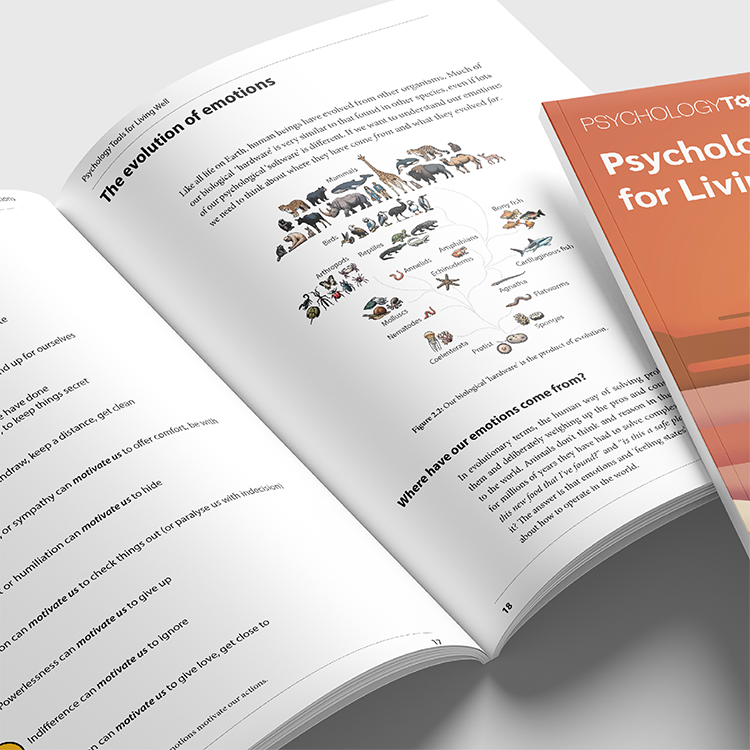
What's inside
- Chapters covering CBT theory, emotions, thoughts, and formulation.
- Client exercises and worksheets, including emotion reflection, perspective-taking, and ABC analysis.
- Case vignettes illustrating panic, depression, anger, and low self-worth.
- Visual diagrams explaining common maintaining mechanisms such as avoidance and safety behaviours.
FAQs
How this resource helps improve clinical outcomes
By increasing a client’s understanding of CBT principles and promoting self-reflection, this resource strengthens insight, motivation, and change-readiness. It helps clients:
- Recognise and modify unhelpful thinking styles.
- Identify maintenance cycles that sustain distress.
- Build emotional regulation skills.
Clinicians benefit from:
- Clearly structured formulations and case illustrations.
- Reproducible worksheets that support client engagement.
Clinicians who use this resource also use
References and further reading
- Blackledge, J. T., & Hayes, S. C. (2001). Emotion regulation in acceptance and commitment therapy. Journal of Clinical Psychology, 57(2), 243–255.
- Hoffman, S. G., Asnaani, A., Vonk, I. J. J., Sawyer, A. T., & Fang, A. (2012). The efficacy of cognitive behavioural therapy: a review of meta-analyses. Cognitive Therapy Research, 36, 427–440.
- Kahneman, D., & Egan, P. (2011). Thinking, fast and slow (Vol. 1). New York: Farrar, Straus and Giroux.
- Koenig, J. The dictionary of obscure sorrows. Retrieved from http://www.dictionaryofobscuresorrows.com/
- Padesky, C. A. (1990). Schema as self-prejudice. International Cognitive Therapy Newsletter, 6(1), 6–7.
- Watts, S. E., Turnell, A., Kladnitski, N., Newby, J. M., & Andrews, G. (2015). Treatment-as-usual (TAU) is anything but usual: A meta-analysis of CBT versus TAU for anxiety and depression. Journal of Affective Disorders, 175, 152–167.
- Yudkowski, E. Fundamental question of rationality. Retrieved from https://wiki.lesswrong.com/wiki/Fundamental_Question_of_Rationality
Just enter your name and email address, and we'll send you Psychology Tools For Living Well (English US) straight to your inbox. You'll also receive occasional product update emails wth evidence-based tools, clinical resources, and the latest psychological research.
Product
Company
Support
- © 2026 Psychology Tools. All rights reserved
- Terms & Conditions
- Privacy Policy
- Cookies Policy
- Disclaimer
Working...
We value your privacy
This site uses strictly necessary cookies to function. We do not use cookies for analytics, marketing, or tracking purposes. By clicking “OK”, you agree to the use of these essential cookies. Read our Cookie Policy

